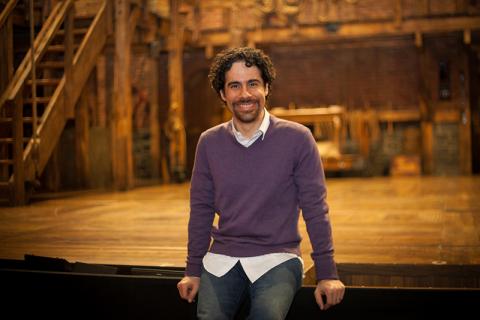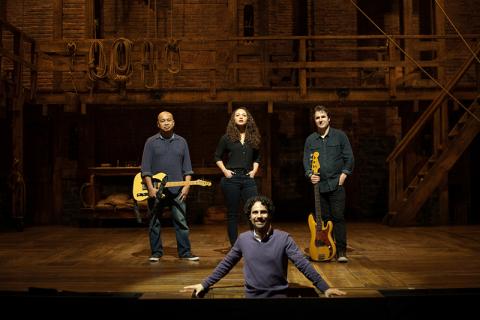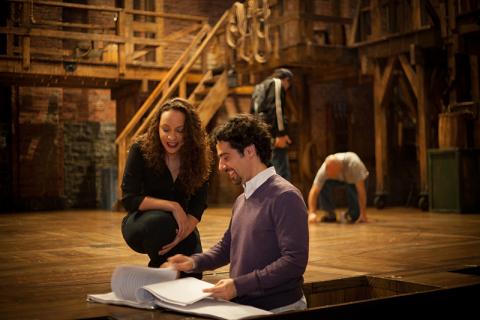Behind the Music of 'Hamilton' with Alumnus Alex Lacamoire

Alex Lacamoire on the set of Hamilton
Tea for Two Photography

Some of the alumni in Hamilton: Alex Lacamoire (foreground); back row, left to right: Robin Macatangay, Jasmine Cephas Jones, Richard Hammond
Tea for Two Photography

Alex Lacamoire and Jasmine Cephas Jones
Tea for Two Photography
Eight times a week, Alex Lacamoire climbs down into the pit at the Richard Rodgers Theatre, prepared to bring to life the music of quite arguably the most popular show on Broadway.
As the music director and orchestrator of the much-buzzed-about Hamilton, Lacamoire ’95 is at the pinnacle of his career. Up until this gig, he’s served as the man behind the music for some of the most talked about recent musical theater productions, in varying roles (Wicked, In the Heights, Bring It On: The Musical, Annie, to name a few); earned a Tony with Bill Sherman (who attended Berklee’s summer programs) for In the Heights; and is up for a Grammy for Best Musical Theater Album as a producer on the original Broadway cast recording of Hamilton.
And like any good “freelancer, ” Lacamoire has his calendar booked. He acknowledges, “Someday, Hamilton will end, and I need to keep planting seeds for other things to other projects, to keep me in the scene, to keep me fresh, to keep me learning.”
Toward that end, Lacamoire has forthcoming gigs as music supervisor of Dear Evan Hansen and music director of Carmen Jones, a Cuban adaptation of the opera Carmen; for the Cuban-American Lacamoire, the latter entails channeling music that’s “in my blood.”
Since Lacamoire burst onto the New York scene with a stint with The Lion King—as a substitute keyboardist in the pit and a rehearsal and audition pianist—he has come to appreciate the precision of musical theater: how organized it is, how several departments work together to create something. “You see how the music is synchronized with the lights and the choreography, and how the set plays a part of it.”
These days, he’s happily sharing Hamilton credits with a complement of Berklee alumni: Richard Hammond '96 on bass; Robin Macatangay '90 on guitar; Jasmine Cephas Jones '09 as Peggy Schuyler/Maria Reynolds; Tim Latham '89, mixer for the cast album; Will Wells '11, music production and editing of loops and drum samples; Khiyon Hursey '14, music assistant for the show and the cast album; Sherman, a fellow producer on the cast album; and brothers, Giancarlo de Trizio '10 (subbing on drums in the pit) and Enrico de Trizio '10 (rehearsal musician running loops/samples).
Hours before a recent production, Lacamoire took some time out for an interview in his dressing room. He talked about his love for musical theater, working with Hamilton creator Lin-Manuel Miranda, lessons he learned at Berklee, and what he’s listening to when he’s not listening to the Hamilton soundtrack.
You’ve had a nice trajectory with Lin-Manuel Miranda, from In the Heights to Bring It On: The Musical, to Hamilton. Can you talk about that relationship?
What’s great about my association with Lin is that he’s so open to suggestions and ideas. He composes wihin Logic [software], programs the drumbeats, finds sounds, writes the songs, the chords, the lyrics. But then it becomes incumbent upon me to write it all down, notate in sheet music so that I can teach it to a singer or orchestrate it for a band.
We now have a shorthand with each other. I feel like I know what he wants, and that he calls me because he knows that I can execute what he’s looking to create. I have a lot of freedom but also a lot of responsibility because it’s his baby; I’m trying to take care of it, and along the way, I get to put a little bit of my own voice into it, which is really important to me as a writer.
And when the material is as a good as what Lin provides, it’s such a joy. I don’t know any other musical theater composers who are writing stuff at this level: from the perspective of lyrics, freshness, pioneering-ness, contemporariness. When he calls you for a gig, you just say yes.
Hamilton is groundbreaking in the sense that it recasts the traditional players in American history. What’s it like to be part of something like that?
It’s amazing. Especially being Latino myself. I love that this show opens up a demographic, in a way. Heights kind of did that in that it brought Latin people to see theater who might not have seen theater otherwise. And for people who do normally see theater, they got a taste of what Latin life is really like. I love that in Hamilton, the multiethnic casting is a statement without being a statement. We don’t ever address it in the show. It’s not talked about that George Washington is played by an African American guy; it just is. The tagline is that “It’s the story of America then, told by America now.” When you think about the fact that this country was built by immigrants, [Hamilton is] saying this is what immigrants look like now. In doing so, it eliminates distance from those founding fathers.
Besides the Hamilton soundtrack, what’s on your playlist?
I just picked up [the] new Sara Bareilles album, which features excellent songs from her musical, Waitress. I’ve been listening to the Kendrick Lamar album; Adele; the latest D’angelo album. I love St. Vincent; I think she’s brilliant. I’m a huge Death Cab for Cutie fan and I love Radiohead. I’m also into classic rock, so I still put on Rush records. Those are the kinds of things I listen to. I’m also very inspired by live performances. When I see live shows, it’s a constant rejuvenation for me because I’m always analyzing: how did they perform this live? I’m super into the mechanics of how things are performed, which is perfect for my gig because that’s what I do for a living. I try to find out how to make something sound cool but also be played by live musicians at the same time. Live performances on Saturday Night Live are a good barometer for me.
How did Berklee influence you as a musician?
Right when I got to Berklee, I loved how many styles I was allowed to play and study and just jam on. The fact that I could take my Stravinsky class in the morning, have a jazz piano private lesson that afternoon, and in the evening play in a caf show featuring all Queen music…that was brilliant. Because I am all those styles, to be able to study all those things and really learn them and not feel exclusive to any of it, was perfect. I think it helps me in my career now. Here I am in this world where I have to straddle all those different kinds of styles and sometimes not necessarily be an expert in all of them, but know enough about them that I can either emulate it, fake it, or pay homage to it.
I completely credit Berklee with keeping me in tune to different styles, keeping me wanting to learn, and introducing me to artists I wouldn’t have learned about otherwise.
I took a Berklee Online class on Ableton Live a couple years ago to prep for Hamilton because we use Ableton in the show. That’s another example of me applying myself, of not being afraid to hit the books again, not being afraid to grow.
What kind of advice do you have for prospective and current Berklee students?
At Berklee, I sought out what I was looking for and found a way to be involved in it. I didn’t coast through it; it would have seemed pointless to not be there to learn. I was hungry for it, and I feel like those who are hungry are the ones who succeed. It takes a certain kind of self-application to do that. But that’s the key to really thriving at Berklee: saying yes to what really inspires you, whether that’s a certain class, working with a certain teacher, playing with a certain player. I would be like, ‘That guy plays awesome, I want to jam with him.’ So I’d find him and say let’s play, and try to forge a relationship that way. I was a go-getter in that respect. I think that applies to real life outside Berklee.
